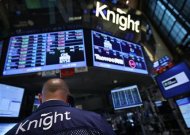Knight seeks financing after $440 million loss; shares drop
NEW YORK (Reuters) - Knight Capital Group Inc is being forced to raise money after an erroneous trading position wiped out $440 million of its capital, the firm said on Thursday, causing its shares to shed half of their value.
Problems at Knight, one of the largest firms that buys and sells stocks to provide liquidity to the markets, emerged at the beginning of trading on Wednesday.
"The company is actively pursuing its strategic and financing alternatives to strengthen its capital base," Knight said in a statement. Its shares were down 49.7 percent at $3.49 in morning trading after hitting a 13-year low of $3.15.
Knight has already approached JPMorgan Chase & Co for financing, according to a report on Fox Business Network. But it was unclear if that financing would be granted. A spokesman for JPMorgan declined to comment.
Wednesday's technology breakdown roiled the prices of some 140 stocks listed on the New York Stock Exchange, undermining fragile investor confidence in the stability of U.S. stock markets.
Speaking on Bloomberg Television, Knight Capital Chief Executive Officer Tom Joyce said the firm had "excess capital right now." On Tuesday night, it had put in new software that had a bug, he said.
The firm said it was in compliance with capital requirements and that it had traded out of the entire position.
"This issue was related to Knight's installation of trading software and resulted in Knight sending numerous erroneous orders in NYSE-listed securities into the market," Knight said. "This software has been removed from the company's systems."
The trading glitches are the latest in a series of market snafus that have eroded retail investors' confidence.
Others include the botched Facebook Inc initial public offering, the 2010 "flash crash" in which nearly $1 trillion in market value disappeared in minutes, and the failed public offering of BATS Global Markets, a rival to the NYSE and the Nasdaq.
Specialists in securities industry operations issues said the wave of recent problems pointed to an unsettling reliance on automated trading facilities that is robbing investors of confidence in the markets.
"We're losing the human control in our business," said Joe Anastasio, a founding partner of financial services consulting firm Capco who specializes in stock trading issues. "We've been so focused on automated throughput of orders and high-volume execution with no human intervention that we have lost the human logic factor when things go wrong."
One of the problems, he said, is that millions of orders stack up overnight for automatic execution at the opening of trading, with a single error potentially creating a deluge of bad trades.
Knight said its principal broker-dealer subsidiaries were fully compliant with their net capital requirements despite the pretax loss of about $440 million that has "severely impacted" the parent company's capital base.
The U.S. Securities and Exchange Commission and the Financial Industry Regulatory Authority are looking into Knight's trading error, according to William Brodsky, CEO of top U.S. options market CBOE Holdings Inc.
"It's obvious that it appears that there was a technology glitch in the trading algorithm," Brodsky told analysts on Thursday. "All markets have rules to address these types of situations."
On July 18, Knight reported second-quarter earnings of $3.3 million, down 81 percent from a year earlier after recording a $35.4 million pretax trading loss from the Facebook initial public offering. The company has not yet filed its second-quarter report with regulators.
Knight's average daily U.S. equities market-making volume has fallen from a year ago as trading volumes have declined across the stock market. Daily market-making volume was $19.5 billion in June, a 12 percent decline from a year earlier.
More than 83 million shares of Knight stock have changed hands on Thursday, making it the most actively traded issue on U.S. exchanges.
(This story has corrected the third paragraph to say stock hit a 13-year low, not all-time low)
(Additional reporting by Jed Horowitz, Sam Forgione, John McCrank, Ann Saphir and David Henry; Editing by James Dalgleish and Lisa Von Ahn)


No comments:
Post a Comment